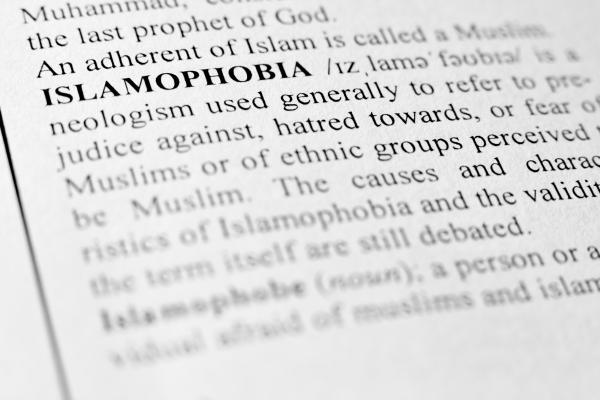IT'S BEEN A difficult few months to be a Muslim living in the United States. Amid the continuing violence in the Middle East and the polarized debate over the Iran nuclear negotiations, Islamophobia in the U.S. is just about as bad as it’s ever been.
While this fear, distrust, and even hatred of Islam and/or Muslims takes many forms and gains traction in a number of ways (as Ken Chitwood explains in his article on page 22), it’s important to understand that Islamophobia gains much of its power and attention from a relatively small number of people who have dedicated their lives and careers to perpetuating a distorted, extreme view of what Islam teaches and what most Muslims believe. It is in fact a tragic irony that professional Islamophobes and Islamic extremists such as the so-called “Islamic State” perpetuate and benefit from a very similar and very warped interpretation of Islam. Both seek to convince the world that many Muslims in the U.S. and around the world either share or should share this radical fundamentalist perspective.
Purveyors of strident hate speech against Muslims and those that embrace violent extremism in the name of Islam actually benefit from each other’s existence and actions. The American Freedom Defense Initiative (AFDI) is the group behind the anti-Muslim ads on public transportation in several major cities. This spring, AFDI sponsored a contest in Garland, Texas, where participants were invited to “draw the prophet” Muhammad. The contest was attacked by two radicalized ISIS sympathizers, who were shot dead by police.
Organizations such as AFDI would not attract any following if it weren’t for the fact that there are indeed radical extremist groups such as al Qaeda and ISIS that have misappropriated Islam as the justification for committing terrible atrocities. These groups really do seek to radicalize and recruit disaffected young people to their cause, encouraging acts of terrorism in the U.S. and around the world. And this radicalization has in some cases succeeded with horrific and tragic results, such as the Boston Marathon bombing.
Yet just as anti-Muslim hate groups such as AFDI depend upon al Qaeda and ISIS for their own continued existence, embracing the publicity they get for what they claim is a courageous speaking of truth, what AFDI and its ilk fail to recognize is that al Qaeda and ISIS, in turn, greatly benefit from the continued existence of paranoid anti-Muslim hate groups such as theirs. When AFDI puts ads on New York City buses not-so-subtly implying that Muslims are “savages,” or reacts to the Charlie Hebdo massacre by sponsoring a contest to draw cartoons of the prophet Muhammad, or announces its intent to publish these cartoons as ads on subways in our nation’s capital—all of these actions help violent extremists with their recruiting efforts by reinforcing the false narrative that the United States is a nation full of blasphemers who hate Muslims, and that we are at war with Islam itself.
I AM NOT suggesting a moral equivalence between anti-Muslim hate groups and terrorists—the latter are actually killing innocent people on a daily basis, and need to be defeated for the safety of Christians, Jews, Muslims, and many others all over the world. But I am suggesting that AFDI needs to understand that its actions are in no way helping to “Defeat Jihad,” as one of its ads puts it. In fact, while AFDI and its allies have been known to label those who denounce them as cowardly, or even as appeasers or enablers of violent Islamic fundamentalism, professional Islamophobia’s own twisted symbiotic relationship with violent Islamic extremism reveals it as the one doing the enabling.
It is inexcusable that two men who bought into ISIS’ warped worldview would seek to inflict death on the participants in the caricature contest in Texas. But it is possible to ascertain the shooters’ motivations even as we condemn them. They were deliberately incited to violence by the actions and ideology of ISIS, but also by the actions and ideology of the professional Islamophobes at AFDI. The responsibility for the deaths of these two men, and the wounding of the security guard, should fall not just on the shooters, but also on the hateful ideology on both sides that set them on their destructive path.
As in many other areas of culture and politics, extremes often need each other, as is happening here. Extremists often think like each other and prefer confrontation as their modus operandi. Religious fundamentalism, in particular, is best defeated from within, rather than from the outside.
You can kill extremists, but you can’t kill extremism by simply bombing the extremists, which often leads to consequences that promote more extremism. Overcoming terrorism is complicated and very difficult, but the promotion of hate toward people of any religion will always make matters worse.

Got something to say about what you're reading? We value your feedback!

